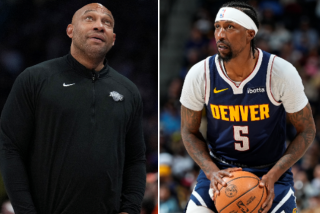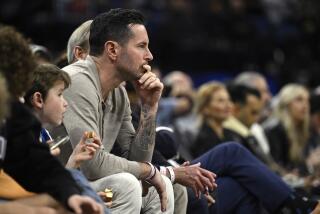PRO BASKETBALL : The Bickerstaff Experiment
- Share via
DENVER — Above him on the corporate ladder sit the first black ownership representatives of a professional sports franchise.
Below him in the Denver Nuggets chain of command sits Paul Westhead, a twice-fired NBA coach who will soon reveal a radical, completely untested offensive and defensive style of play.
Between an ownership group that has added new meaning to the term unstable in its first year on the job and the third-time-around coach who is embarking on a journey into uncharted waters, sits Bernie Bickerstaff, the rookie general manager of the Nuggets.
This is not unlike the NBA’s answer to the Dallas Cowboys’ experiment of a year ago when a new owner and a new coach took over a franchise and gutted it from top to bottom and started all over.
The Cowboys finished 1-15 with their bold venture, which, projected over an 82-game NBA season, figures out to roughly 5-77.
The Nuggets won’t be, they can’t possibly be, that bad. A good college team, say, one like the Loyola Marymount team Westhead coached the past few seasons, could win more than five games, but that shouldn’t diminish the immensity of the task facing Bickerstaff and the rest of the Denver organization.
“We need talent,” Bickerstaff said in his office Tuesday. “I don’t care what kind of coach you are, you’ve got to have talent. Right now, that’s where we’re most deficient.”
By no means is that Bickerstaff’s only area of concern.
Around the NBA, there are degrees of difficulty in tasks assigned to general managers. Some of them have to deal with owners more fluent in the traditional forms of American business language. Some general managers have to deal with a talent shortage, others are faced with the thorny problem of hiring the right coach for the particular mix of personnel on hand. Some teams need only minor adjustments, some, like the Nuggets, are in need of major overhauls.
Bickerstaff’s duties are different in one respect from all the other general managers in the NBA. He is in the middle of one of biggest talent gaps, one of the most stressful ownership situations and the most questionable coaching philosophy in the league, and he has to deal with it all while learning his own job on the run.
“With all the changes that have happened here, the (Denver) media is knocking us, saying we’re at the same level as an expansion team,” Bickerstaff said, “and that’s not too far removed from where we are. I have no complaints with that judgment, but we don’t intend to be at that level for a long period of time. In the interim, my job is to always be looking for ways to improve the people we have, stay flexible, keep adjusting, keep upgrading, keep moving forward.”
The Nuggets can hardly back up any more than they already have. They were purchased a year ago by a group that included black investors Peter Bynoe and Bertram Lee, and the NBA began trumpeting the deal as the first case of black ownership of a major professional franchise.
The truth is, Comsat Video Enterprises owns 62.5 percent of the team, and the chief executive officer of Comsat, who serves as majority owner of the team, is Bob Wussler, a white former TV executive. Lee is the managing general partner of the Nuggets, a significant position, but not the one announced by the NBA.
Within the last year, the Nuggets fired, among others, club president Jon Spoelstra and marketing executive Ken Wilson, who have each filed lawsuits over their dismissals. On Monday of this week, former assistant coach Doug Moe Jr., the son of former coach Doug Moe, who were both fired Sept. 5, filed the latest lawsuit against the Nuggets, claiming he was fired in part because he was white.
“Let’s get it all out there,” Bickerstaff said when asked about Moe Jr.’s lawsuit. “This is the time for it, let’s put it all behind us.
“The lawsuit said he was fired over his color? Was there any mention in there about nepotism?”
Bickerstaff is smart enough to know race will inevitably creep into whatever he does, wherever he goes. It happened when he was an assistant for 12 years with the Washington Bullets, it happened when he was the coach of the Seattle SuperSonics and it is happening again in the Moe Jr. lawsuit.
One of the contentions in Moe Jr.’s lawsuit is that Lee let it be known he wanted to hire only black people in the organization, therefore Moe Jr. was fired partially because he was white. The problem with that is that Bickerstaff hired Westhead, a white head coach, and brought in a white assistant to the general manager.
“It’s no different than Seattle when letters were appearing in the papers about the 11 black players on the team,” Bickerstaff said. “Racism is universal, it’s everywhere, it depends on who’s coaching those 11 basketball players and who’s doing the hiring.
“I say from experience, it’s real obvious when you see something happen like (Moe Jr.’s lawsuit), because there are black people involved in ownership. Let’s reverse it now, and count up all the professional franchises in all the sports and see how many of them are owned by white people, and then see how many of them are filled with mostly white employees. Have we had lawsuits filed lately questioning owners who hire mostly white people?
“As a black man in this country,” Bickerstaff said, “you learn to deal with it, because wherever you are, you know it’s coming, sometime.”
There might have been more to complain about had Bickerstaff hired a black coach, and his first inclination was to do just that. He called Cleveland general manager Wayne Embry and asked about Cavaliers coach Lenny Wilkens.
“Wayne said that Lenny figured into their plans, they were very happy with him, he was their guy,” Bickerstaff said. “That’s as far as I took it. I was interested to see who might be available and at the top of the list were Lenny Wilkens and Paul Westhead.”
Bickerstaff and Westhead first got to know each other when they were rival coaches in the 1970s in a Puerto Rican summer league.
“The only reservations I had was about my family, which was pretty comfortable in Los Angeles,” Westhead said. “It was a hard personal choice, but for the opportunity to return to the NBA and to work with Bernie, I couldn’t turn it down.”
The Nuggets will certainly be the most unorthodox team in professional basketball this season, with Westhead’s unique ultra-fast break offense and high-pressure, full-court defense. The question is whether he can convince highly paid professionals to put in the work required to make the system click.
“That’s an interesting conjecture,” Westhead said. “I would think we will probably discover some who won’t want to buy into it, but I would think it is just as likely that there are as many out there who will buy into it. We just have to locate them.
“The thing is,” he said, “I know my scheme works, and I know it is extremely demanding and challenging to execute. I also know that, diluted, it doesn’t work at all, it is very miserable to watch at anything less than full speed ahead.
“What I think will happen when we get these guys running it is we’ll show up in someplace like Madison Square Garden some night, and I’m not sure who all we’ll have, but it will be, ‘This is showtime guys, and guess what? We’re the show.’ I can’t wait to get started.”
Had Bickerstaff not accepted the general manager position with the Nuggets, chances are very good that Westhead would still be at Loyola Marymount.
“Businessmen, even in the NBA, are generally conservative by nature; they like to see something to work first before they buy,” Westhead said. “These people have entrusted the basketball decisions to Bernie, and whereas some might be concerned about grabbing hold of something (like Westhead’s scheme) that could start spinning out of control, Bernie wasn’t concerned about that, he knows the deal.”
Before it’s over, and possibly soon after the season starts, the Nuggets might well score 200 points in a single game, which is the sort of stuff that intrigues the paying public.
“We scored 181 (at Loyola-Marymount), so you would think it’s possible,” Westhead said evenly. “If I were in a brash mood, I’d predict it. When I was in LA, I came up with the line that we’d score 200 points before the first snowfall, but that was in LA. I’m not ready to repeat that statement in Denver, at least not until I have a few weeks to work with these players.”
The enthusiasm is certainly there in the coach and the general manager, if not yet the public.
“Let’s pump it, let’s go,” Bickerstaff said. “I’m a rookie, and there’s a lot of guys out there waiting to test me. They (other general managers) all think they’re getting a virgin when they deal with me, but I’m pretty well-schooled. I’ve been in the NBA 18 years and I’ve learned from people like K.C. Jones, Dick Motta, Lenny Wilkens and Gene Shue, all
“I’ve wanted to be in this position ever since the Bullets. When you’re an assistant for 12 years, you have a lot of time to think about things, and this is definitely one of the things I’ve wanted to do. I learned you can’t try to imitate others, you have to have your own style and that style has to be developed. That’s what I’m here for.”
One of Bickerstaff’s best attributes might be his ability to hear, then see what others do.
“There’s a difference between listening and hearing,” he said. “You have to hear what others are saying and you have to afford them the opportunity to get involved. You hear what they say to understand what image they want you have, then down the road you observe their application of what they say.
“I know 10- and 11-year-olds who know the right things to say, but later I find them doing something totally different. What I want is authenticity. I believe what I see, because you can’t hide what you do. When I see you back up your words with your actions, that’s when I become a believer.
“I’m not in the business to hear good stories from people,” Bickerstaff said, “I want the real deal, and you usually can’t sort that out until you go to battle with somebody. That’s when you separate the real people from the talkers.”
Just over a month from now, the Great Rocky Mountain Experiment will begin for real.
If it works, a month or so after that, the Nuggets will have registered their first 200-point game.
Then, when somebody mentions life in the fast lane, chances are the subject will be the Denver Nuggets.
More to Read
Go beyond the scoreboard
Get the latest on L.A.'s teams in the daily Sports Report newsletter.
You may occasionally receive promotional content from the Los Angeles Times.










